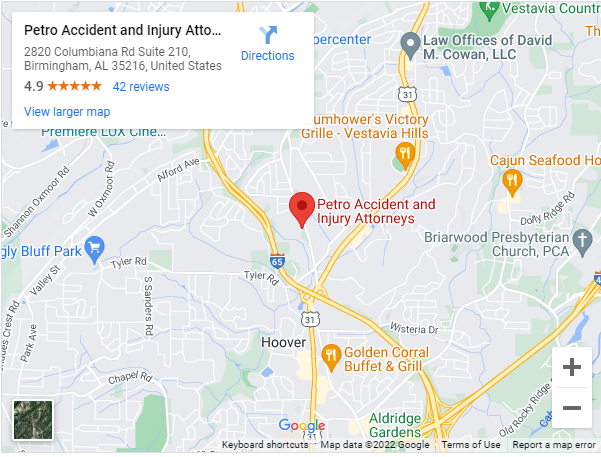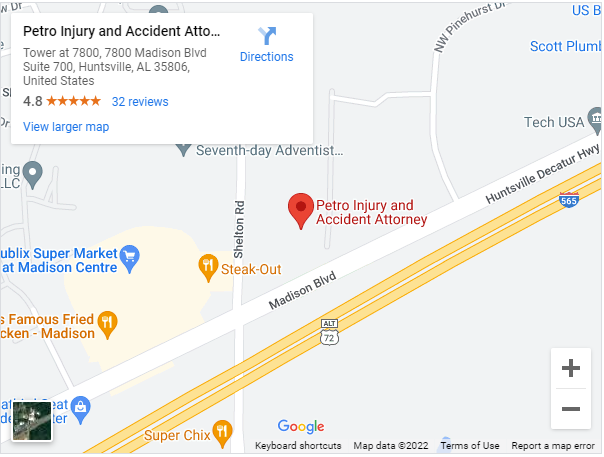Seek Full Compensation for Your Head-On Collision Injuries in Alabama.
If you’ve been injured in a head-on collision in Alabama, our Alabama head-on collision attorney at Petro Accident and Injury Attorneys is here to help. We have years of experience handling car accident claims and personal injury cases, and our Alabama personal injury lawyer is ready to provide you with excellent legal service and representation.
If you have been injured in a head-on collision in Alabama, don’t hesitate to call Petro Accident and Injury Attorneys. We understand the complex legal issues involved in these cases and will fight for your rights to get the compensation you deserve. Call us today for a consultation.
What is a Head-On Collision?
Head-on collisions occur when two vehicles traveling in opposite directions collide with each other, usually front-end to front-end. These accidents often happen on two-way roads, highways, or intersections when one driver crosses the centerline or median and enters the path of oncoming traffic. The impact can be severe, resulting in significant injuries or even fatalities.
What are the most common injuries sustained in head-on collisions?
Head-on collisions frequently result in severe injuries that can have a life-altering impact. Tragically, many drivers and passengers also lose their lives in these types of crashes.
Some of the most common injuries sustained from a head-on collision include:
- Severe injuries: Head-on collisions can cause severe injuries to the legs, feet, and knees, potentially leading to amputation or permanent disability.
- Broken bones: Head-on collisions can cause broken bones in the ribs, arms, hips, and brain, in addition to possible damage to the legs and feet. These accidents usually take several months to heal and require a lot of physical therapy.
- Head and brain injury: Traumatic Brain Injuries (TBI) can result in significant physical, emotional, and psychological impairments.
- Neck, back, and spinal injury: Neck, back, and spinal injuries can cause excruciating pain and paralysis.
- Disfigurement: Severe cuts and burns in head-on collisions can lead to disfigurement, impacting self-esteem and overall well-being.
- Internal organ damage: Damage to internal organs can be long-lasting, requiring months of healing and potential organ failure.
What are the common causes of head-on collisions in Alabama?
There are several common causes of head-on collisions in Alabama. Distracted driving, intoxicated driving, reckless and aggressive driving, failure to yield, defective vehicle parts, and poor road conditions can all contribute to these accidents.
- Distracted Driving: Motorists who are deeply engrossed in sending text messages or distracted by other things have a higher likelihood of causing head-on collisions. This is because they may unintentionally veer into the path of oncoming vehicles, drive in the wrong direction on one-way streets, or disregard traffic regulations in other ways.
- Intoxicated Driving: When drivers are under the influence of alcohol or drugs or experiencing extreme fatigue, their cognitive abilities are significantly affected. This impairment can make them highly vulnerable to making unsafe maneuvers while driving, which in turn increases the risk of head-on collisions.
- Reckless and Aggressive Driving: Engaging in reckless and aggressive actions such as driving at excessive speeds, making unsafe lane changes, and constantly switching lanes in heavy traffic can significantly raise the chances of a driver losing control of their vehicle. As a result, there is an increased risk of causing a head-on collision.
- Failure to Yield: Drivers who neglect to give up their right-of-way when turning, merging, or navigating intersections have a higher probability of causing head-on collisions.
- Defective Vehicle Parts: Insufficient maintenance or substandard manufacturing of vital car components or systems can result in flaws. When these flaws lead to mechanical failures, drivers may lose control of their vehicles, making it difficult to prevent a head-on collision.
- Poor Road Conditions: Inadequate road conditions, such as poor water drainage, large potholes, or missing road signs, can play a role in head-on crashes. They can cause drivers to lose control of their vehicles, swerve abruptly to avoid hazards, or become disoriented, increasing the likelihood of a head-on collision.
Alabama Car Accident Laws
Alabama personal injury law follows a fault-based approach. This means that, in the event of a car accident, victims are required to pursue compensation from the insurance company of the party at fault. Once you file a car insurance claim, you have the right to pursue further compensation by filing a personal injury lawsuit if the responsible party acted negligently.
However, it’s important to note that Alabama operates under a “contributory negligence” law. This means that if you are found to bear any responsibility for causing the accident, you may be prohibited from seeking additional compensation.
By engaging the services of our Alabama personal injury lawyer, you can ensure that all possible legal avenues for obtaining compensation will be thoroughly explored and pursued.
Who is responsible for injuries in a head-on collision in Alabama?
When a head-on collision occurs in Alabama, the potential for severe injuries is significant because vehicles are moving toward each other, often at high speeds. These injuries can have long-lasting effects on the victim’s life and may require expensive ongoing medical care and support.
It is crucial to seek compensation from the responsible party to help cover medical expenses and other related costs. Depending on the specifics of the accident, multiple parties could be involved and held accountable for the collision.
- Negligent Driver: In Alabama, a driver who acts negligently by disregarding traffic laws, crossing into oncoming traffic, or misinterpreting road signs can be held responsible for a head-on collision. As long as the driver’s careless or reckless behavior directly caused the accident leading to injuries and other damages, they can be held liable in a personal injury claim.
- Unexpected Roadway Events: In certain situations, events such as road conditions, tire blowouts, swerving to avoid obstacles, medical emergencies, or mechanical issues can contribute to a driver unintentionally drifting into oncoming traffic. This can, potentially absolve the driver of full responsibility for resulting injuries.
- Other Motorists or Pedestrians: In cases where a driver swerves into oncoming traffic to avoid a sudden obstacle, fault usually lies with the pedestrian or the driver of the other vehicle. Unfortunately, proving liability can be difficult if the responsible parties flee the scene.
- Government Entity: Certain head-on collisions can be attributed to inadequate road design and maintenance, particularly in cases involving left-turn and reversible lanes, or the absence of a center median in Alabama. In such instances, the government entity responsible for the roadway may be held accountable for the collision if they were aware of issues like a fading center median or unclear directions due to a lack of road signs.
- Manufacturer: If a head-on collision is caused by faulty vehicle parts or a tire blowout, the vehicle or tire manufacturer can be held responsible, such as in the case of a power steering failure that leads to a loss of control while turning. In such instances, the victim can attribute the crash to the manufacturer’s failure of the power steering system.
What is Alabama’s statute of limitations for head-on collision injury claims?
According to Alabama Code Section 6-2-38, there is a specific time limit for filing personal injury claims, including those related to car accidents. You have two years from the date of the accident to initiate your claim.
It is crucial not to wait too long because if the statute of limitations expires, you will be unable to proceed with your claim and will be barred from seeking compensation.
Are there exceptions to the Alabama statute of limitations?
Although the statute of limitations generally applies to most car accident cases in Alabama, it is important to note that certain exceptions can either shorten or extend the deadline. The exceptions to the car accident statute of limitations in Alabama include the following:
- Wrongful Death: In Alabama, you can file a wrongful death claim within two years from the date of your loved one’s death (instead of from the date of the accident).
- Car Defect: If your accident was caused by a defective car part, you typically have one year from the date of the injury or death caused by the defect to file a product liability claim.
- Minor Victims: Minors who are car accident victims have a longer period to initiate legal proceedings, as the statute of limitations does not begin until they turn 18 years old. Before turning 18, a parent or legal guardian can file a claim on behalf of the child.
Can I file a lawsuit for my head-on collision injury?
Being involved in a head-on collision can be a terrifying and life-altering experience. The physical and emotional toll of such an accident can be overwhelming, leaving victims with mounting medical bills, lost wages, and long-term injuries. In the aftermath, many individuals wonder if they have the right to seek legal recourse and file a lawsuit for their head-on collision injury.
Many factors must be considered to determine your eligibility to file a lawsuit after a head-on collision. A qualified Alabama personal injury attorney and head-on collisions lawyer can help you understand the concept of negligence, the role of responsible parties, and the potential compensation you may be entitled to.
How can I prove negligence in my head-on collision injury claim?
Proving negligence in a head-on collision injury claim is crucial in order to seek compensation for the damages suffered. Negligence refers to the failure of an individual to exercise reasonable care, resulting in harm to another person. To prove negligence in a head-on collision injury claim in Alabama, you need to establish four key elements: duty of care, breach of duty, causation, and damages.
The first element to prove negligence is establishing a duty of care. In the context of a head-on collision, all drivers have a duty to operate their vehicles safely and follow traffic laws. This means driving within the speed limit, maintaining control of the vehicle, and obeying traffic signals and signs.
The second element is proving a breach of duty. This involves demonstrating that the defendant failed to meet the standard of care expected of them. In a head-on collision case, this could include actions such as driving under the influence of alcohol or drugs, distracted driving, or reckless driving.
To strengthen a head-on collision injury claim, gathering relevant evidence is crucial. This leads us to the second point of discussion.
What evidence do I need to support my claim?
To support a head-on collision injury claim, collecting as much evidence as possible is important. Here are some key pieces of evidence that can help establish negligence:
- Police Reports: Obtain a copy of the police report filed at the scene of the accident. This report often contains valuable information such as statements from witnesses, diagrams of the accident scene, and the officer’s opinion on who was at fault.
- Eyewitness Statements: If there were any witnesses to the accident, their statements can provide crucial evidence. Collect their contact information and ask them to provide a written or recorded statement of what they saw.
- Photographs and Videos: Take photographs or videos of the accident scene, including the position of the vehicles, skid marks, and any visible injuries. These visual records can help recreate the accident and establish fault.
- Medical Records: Obtain copies of all medical records related to your injuries. This includes records of emergency room visits, hospital stays, surgeries, and any ongoing treatment. Medical records provide evidence of the extent and severity of your injuries.
- Expert Opinions: If necessary, consult with accident reconstruction experts or medical professionals who can provide expert opinions on the cause of the accident and the nature of your injuries.
- Documentation of Damages: Keep records of all financial losses incurred as a result of the accident, such as medical bills, vehicle repair costs, and lost wages. These documents will help calculate the compensation you are entitled to.
How much compensation can I get for my head-on collision injury?
The amount of compensation you may be entitled to in a head-on collision injury claim in Alabama varies depending on several factors. These factors include the severity of your injury, its impact on your daily life, and the extent of the damages incurred.
Compensation in a head-on collision injury claim typically covers:
- Medical Expenses: This includes current and future medical bills, hospital stays, surgeries, medications, and rehabilitation costs.
- Lost Wages: If your injuries prevent you from working, you may be entitled to compensation for your lost wages and any potential future earning capacity.
- Pain and Suffering: Compensation may be awarded for physical pain, emotional distress, and the overall impact the accident has had on your quality of life.
- Property Damage: If your vehicle or other property was damaged in the accident, you can seek compensation for the repair or replacement costs.
- Punitive Damages: In cases where the defendant’s actions were particularly reckless or intentional, punitive damages may be awarded as a form of punishment and to deter similar behavior in the future.
If you wish to get a more accurate estimate of the compensation you are entitled to, speak with our experienced Alabama head-on collisions attorney. We can guide you through the legal process and help you maximize your chances of receiving fair compensation.
What to Do After a Head-On Collision in Alabama
If you are involved in a head-on collision in Alabama, it is important to take certain steps to ensure your safety and protect your legal rights. Here’s what you should do:
- Check for injuries. First and foremost, assess yourself and others involved in the accident for any injuries. Call for emergency medical assistance immediately if anyone requires immediate medical attention.
- Move to a safe location. If possible and it is safe to do so, move your vehicle to the side of the road or a safe area to avoid further collisions or obstruction of traffic.
- Contact law enforcement. Dial emergency services or the local police to report the accident. They will come to the scene, assess the situation, and create an accident report. This report will be important for insurance claims and any legal actions that may follow.
- Exchange information. Exchange necessary information with the other driver(s) involved, including names, contact details, driver’s license numbers, insurance information, and vehicle registration details.
- Gather evidence. If you can safely do so, collect evidence from the scene. Take photos of the vehicles involved, the damage caused, skid marks, traffic signs, and any other relevant details. This evidence can be useful during claims.
- Identify witnesses. If there were any witnesses to the accident, try to obtain their names and contact information. Their statements may be valuable in supporting your case later on.
- Seek medical attention. Even if you do not have apparent injuries, it is advisable to get a medical evaluation. Some injuries may not be immediately noticeable but could manifest later. A medical report will also be important for insurance claims and legal purposes.
- Report the accident to your insurance company. Inform your insurance company about the accident as soon as possible. Provide them with accurate details and follow their instructions regarding the claims process.
- Consult a personal injury attorney. Speak with our Alabama head-on collision lawyer, who can guide you through the legal process, protect your rights, and help you pursue any claims or compensation you may be entitled to.
Every accident situation is unique, so it’s important to consult legal professionals for personalized advice based on your circumstances.
Why Do I Need a Head-On Collision Attorney in Alabama?
In Alabama, the legal framework can pose challenges for accident victims seeking fair compensation for their injuries and losses following a head-on collision. However, you do not have to face this challenge on your own. Our committed head-on collision attorneys in Alabama at Petro Accident and Injury Attorneys are here to support you by:
- Clearly explaining your legal rights
- Conducting a thorough investigation of the head-on collision to establish liability
- Identifying all possible avenues for compensation
- Acting as your representative in communications with insurance companies and other parties involved
- Gathering essential evidence, such as medical records and crash reports
- Interviewing witnesses and consulting reliable experts for valuable testimony
- Managing crucial claim documents and ensuring deadlines are met
- Handling the necessary paperwork and engaging in vigorous negotiations to pursue fair compensation
- Advocating for your case in court and representing you at trial if the insurance company refuses to provide a suitable settlement
Get Personalized Legal Assistance From Our Experienced Alabama Head-On Collision Lawyer
Facing the aftermath of a head-on collision in Alabama can be a daunting and complex process. However, you don’t have to navigate it alone. Petro Accident and Injury Attorneys is a highly dedicated law firm that understands accident victims’ challenges while seeking fair compensation for their injuries and losses.
With Petro Accident and Injury Attorneys by your side, you can trust in our extensive experience and unwavering commitment to assisting you throughout the entire legal process. Our Alabama head-on collision attorney will diligently pursue all potential sources of compensation on your behalf.
Don’t let the complexities of Alabama’s laws discourage you from seeking the justice and fair compensation you deserve. Contact us today to schedule a consultation and discover how our exceptional legal services can provide the guidance and support you need during this challenging time.
Petro Accident and Injury Attorneys also assists in car accidents, truck accidents, drugged driving accidents, and motorcycle accidents.




